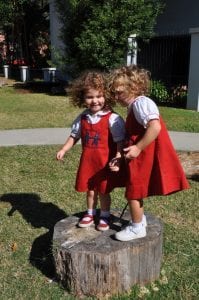 As I was going through the Pre-K admissions process last year for my youngest child Harry, I could not help but have anxiety. Was he ready? Was he prepared? Even though all the research today points to the importance of play for this age group, I could not stop worrying about his future success at “big” school. How will he do with ABC’s and 123’s?
As I was going through the Pre-K admissions process last year for my youngest child Harry, I could not help but have anxiety. Was he ready? Was he prepared? Even though all the research today points to the importance of play for this age group, I could not stop worrying about his future success at “big” school. How will he do with ABC’s and 123’s?
What I was reminded of by his “big school” teachers at our first conference is that learning to be a successful member of a community is INVALUABLE. If your child has experienced waiting for a turn, speaking up when he or she needs something, and problem solving with friends, then the rest comes easily and naturally.
Through my own children’s pre-school experiences and through the numerous children I meet through the McGehee admissions process, I am reminded again and again about the important value of socialization in the life of a young child.
One of the most common statements we hear when touring parents for preschool for their child is “I want my child to have an opportunity to be around other children.”
In my role as Director of Lower School Admission for Louise S. McGehee School and Reggio Curriculum Coordinator for McGehee’s Little Gate and as a mother, I am afforded the wonderful opportunity of witnessing on a daily basis just how valuable your pre-school selection is to your child’s future success at school.
One primary purpose for young children to attend an early childhood program is for socialization.
When a child is part of a school community they are:
- learning how to communicate their wants, needs and ideas to others
- given the opportunity to feel empathy and the importance of caring for others
- experiencing acts of independence and the pride that comes along with that
- being part of a group dynamic which includes taking turns, problem solving, and sharing joyful experiences with others
- broadening their core group of care givers by creating strong relationships with teachers
Socialization and learning to be a part of a community is hard work!!
How can preschool help your child navigate their first experiences with the world around them?
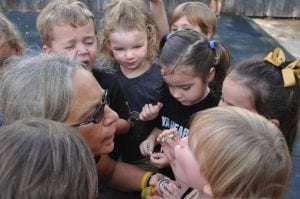 A preschool’s philosophy influences their approach to socialization. At McGehee’s Little Gate we are inspired by the Reggio Emilia approach to early childhood education. We believe this approach in particular allows children to naturally participate in these social successes. Early Childhood educators must take a thoughtful approach to how they create their environment in order to achieve the possibility and success of certain social experiences.
A preschool’s philosophy influences their approach to socialization. At McGehee’s Little Gate we are inspired by the Reggio Emilia approach to early childhood education. We believe this approach in particular allows children to naturally participate in these social successes. Early Childhood educators must take a thoughtful approach to how they create their environment in order to achieve the possibility and success of certain social experiences.
Here are some experiences we have found to be very fruitful in helping children become a successful part of a school community:
- Offering a variety of open ended materials in several areas in the classroom – For instance open ended materials can be long pieces of material placed in the dramatic play area. These become picnic blankets, capes, veils, or satchels. Instead of offering only materials that have a clear, defined purpose, thinking “out of the box” allows the children to negotiate and make agreements about the identity, purpose and function of these materials. When we place gems, corks, and tubes in the construction area, alongside of our traditional blocks, block people and animals, it stimulates thoughtfulness, creativity, investigation, complex thinking and communication.
- Utilizing an emergent curriculum approach, teachers are guided by the children’s interests. When focusing a unit of study on a topic of interest to a child (such as rainbows), the teachers can use that student-fueled passion and interest in rainbows to help further language development, collaboration, risk taking and working together on tasks for longer periods of time.
- Side by side art collaboration – often teachers will set up the exact same materials for two children side by side so they share one part of the projects’ materials, in order to encourage conversation, taking turns, and possible collaboration on their project work.
- Collaboration stations – many opportunities are offered for children to work at manipulative tables where children are
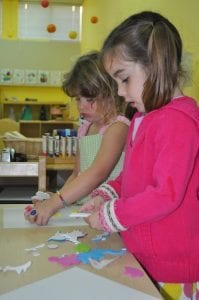 constructing and building side by side, yet not necessarily creating together. Often times teachers pay careful attention to only offer a certain number of funnels for the rice pour and sift exploration, or only offer certain lengths of ramps for the car and truck building stations. Focus on providing a large variety of objects emboldens children to problem solve, work together, take turns, speak with friends, and try other tools in their play.
constructing and building side by side, yet not necessarily creating together. Often times teachers pay careful attention to only offer a certain number of funnels for the rice pour and sift exploration, or only offer certain lengths of ramps for the car and truck building stations. Focus on providing a large variety of objects emboldens children to problem solve, work together, take turns, speak with friends, and try other tools in their play. - Offering opportunities to care for others is important in a community. Helping a friend get a wet paper towel when she falls down is a great way to instill empathy. We feel taking turns caring for school pets, such as our Hedgehog “Hedgie,” and caring for our vegetable garden, classroom plants, and our backyard tree, “Windy,” are all important opportunities to have children experience the joy, pride and connection we feel when we take care of important parts of our Little Gate community.
- Last, building relationships with both friends and teachers is a huge part of the socialization process in a school. There are so many ways to build and further these relationships: sharing meals with teachers and friends, snuggling to read books with teachers in the book nook, sharing a triumph of jumping over logs with a friend outdoors, and knowing that at the end of the day…mom or dad always comes back!
Most importantly at Little Gate we learn on a daily basis that we can learn from our students as much as they learn and grow by being part of our Little Gate community. Providing these rich, social experiences in a Reggio inspired environment gives young children an excellent foundation for not only future success in “big” school but throughout their lives.
Mimi Odem
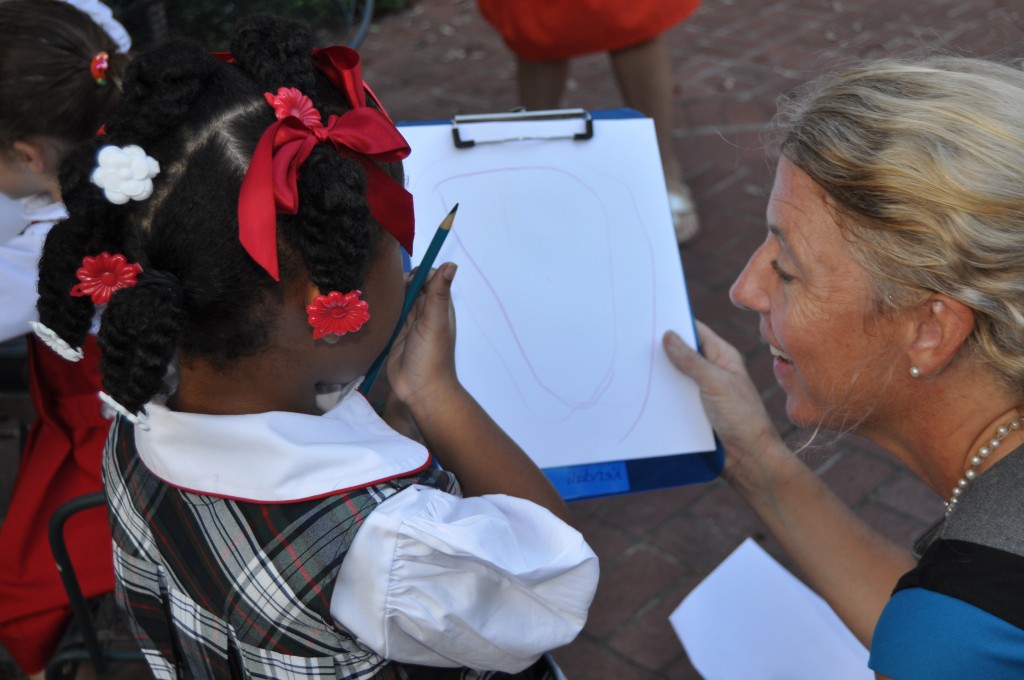 As an educator and an administrator at Louise S. McGehee School, Mimi Odem has been immersed in the classroom as a lead teacher, served as Director of McGehee’s Little Gate and is currently loving her role as the Director of Lower School Admission at Louise S. McGehee School. She also “keeps her hand in the cookie jar” and stays involved at Little Gate as the curriculum coordinator. Early childhood education is Mimi’s passion and expertise. Being the mother of three children has allowed Mimi some in depth, hands-on experience and she loves every minute of her many roles.
As an educator and an administrator at Louise S. McGehee School, Mimi Odem has been immersed in the classroom as a lead teacher, served as Director of McGehee’s Little Gate and is currently loving her role as the Director of Lower School Admission at Louise S. McGehee School. She also “keeps her hand in the cookie jar” and stays involved at Little Gate as the curriculum coordinator. Early childhood education is Mimi’s passion and expertise. Being the mother of three children has allowed Mimi some in depth, hands-on experience and she loves every minute of her many roles.












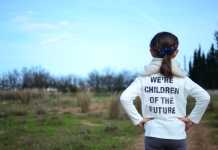

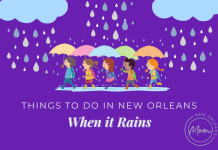


What is considered a good age to start them in early pre-K?
Jessica – I am sorry for the late reply – I think this is an individual – case by case situation. Many times it depends on the family’s needs, as well it can depend on how your child adapts to new situations. At Little Gate, we have MANY children that start in our one year old program. However, we also have several children that start at three and four.
I think you have to take each case separately. If the program you are looking at is developmentally appropriate for each different age it caters to, than you should find a joyful experience. I wish you luck on making these decisions! It is an exciting time in a parent’s life!
Thanks so much for posting this – perfect timing. My daughter just turned 2 and her teachers told me they always forget she is only 2 because she seems older than the other kids in her class. She is one of the oldest in the class because her birthday falls shortly after the cut-off, but that comment also caused me some anxiety. While I was thrilled that they feel she is advanced, it also started to question if she is learning enough, is she surrounded by other kids on her level to challenge her, are the other children verbal enough to continue to advance her speaking skills, etc. This article really helped ease my fears and show me what I really should be looking for at this age. Thanks!
The family can do exactly what was described in this article. To take a child out of the family earlier and earlier is not a good thing. There was a time when children did not have kindergarten but they grew up well socialized and got a much better education in the public schools. Be assured that the family is first and foremost the best thing for any child and to take them out of the home earlier is only beneficial for the people making money off these children.
Thank you so much for reading, Barbara! As a full-time working mom, I actually felt differently about this piece. I sometimes wonder if my son is “too young” for preschool and if he’d be “better off” being at home with me. That said, our family’s reality doesn’t allow that at the moment, and I think it’s reassuring to know that there are programs out there designed for little ones that go beyond baby-sitting. The school where my son is enrolled is a non-profit, so they are not driven by financial motives. Rather, I have found that they are motivated to create and foster a positive environment in which the youngest learners can thrive and that – to me personally – is reassuring. And for us personally we have seen a lot of benefits in having our son enrolled; he’s really verbal, communicates well and is fairly good about sharing and playing with others. I am not sure – though I don’t know – that he’d be in the same place if it weren’t for the daily exposure to other friends.
In our home, we’ve been discussing when would be the best age to enroll our daughter in an early preschool since we are both full time working parents. Since she’s been home with a private sitter and not around other children, our pediatrician even said the socialization with other children her age would be good for her development. Thank you for this article since I continually struggle with working mom guilt, the confirmation that it’s not a bad thing to enroll your child in an early childhood program is refreshing!
My 2 older children (currently ages 6 & 7) attended Little Gate from early on (I was a teacher there for several years until our twins came along). Our experience there was AMAZING! They both ask to go back to Little Gate to visit all the time! If you have the opportunity to tour I would highly recommend it and it’s never too early to put in an application if you love the program which I am willing to bet you will!.
Unfortunately, not everyone can afford preschool. Headstart is understaffed and has more children than they can handle, & public schools that offer pre-k only accept so many kids. There are other ways to socialize your kids, thankfully. Play groups, playing at the park, the library, playing with kids in the neighborhood, taking them out to eat, or plying restaurant at home teaches them how to be polite, ask for what they need, & so on. It’s unfortunate that pre-k is not considered important enough for every (public) school to offer it free.
Does anyone have any info on affordable preschool in the northshore? Our family is new to the area and I feel like I need to get my 3 year old into preschool. I’m having trouble just finding them. The ones that I have found are all filled up and so much money. Thank you!